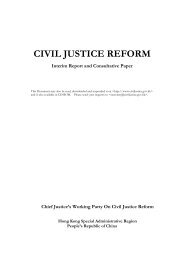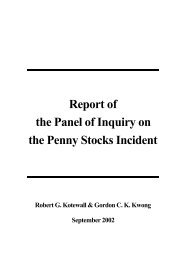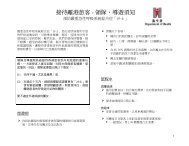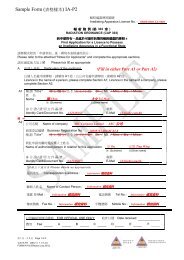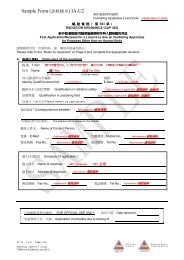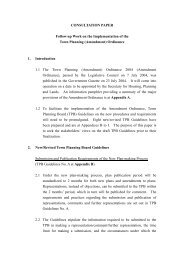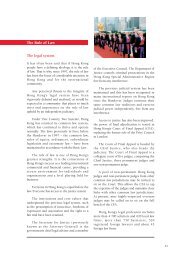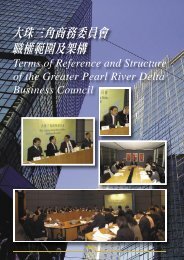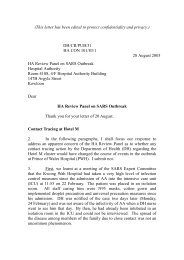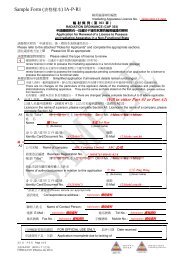INLAND REVENUE BOARD OF REVIEW DECISIONS Case No. D41 ...
INLAND REVENUE BOARD OF REVIEW DECISIONS Case No. D41 ...
INLAND REVENUE BOARD OF REVIEW DECISIONS Case No. D41 ...
You also want an ePaper? Increase the reach of your titles
YUMPU automatically turns print PDFs into web optimized ePapers that Google loves.
<strong>INLAND</strong> <strong>REVENUE</strong> <strong>BOARD</strong> <strong>OF</strong> <strong>REVIEW</strong> <strong>DECISIONS</strong><br />
(i) <strong>Case</strong>s stated can be divided into two types, the classic and the factual. The<br />
classic type requests a decision on a precise question which does not involve the entire<br />
proceedings or the entire evidence before the Board and it is appropriate to extract from the<br />
decision and/or evidence those facts which are relevant to enable the judge on appeal to hear<br />
the case and make his decision. This is the classic form of case stated and is the most<br />
appropriate type of case stated procedure. It is the one covered by the precedents and which<br />
the courts have had in mind.<br />
(j) Where the question is whether on the whole of the evidence before it the Board<br />
could properly determine something which it did, it is difficult or impossible for the Board<br />
to state a case in the classic form.<br />
(k) There is a substantial distinction between the classic case and the factual case<br />
and this distinction has been highlighted by the present case and the problems which<br />
Counsel have encountered in trying to reach agreement on the form and content of the case<br />
stated. It is necessary for all of the evidence to be placed before the judge on appeal because<br />
he is being asked to decide whether ‘on the whole of the evidence’ the Board could have<br />
reached the decision which it did. It is pointless and possibly misleading for the Board to<br />
restate the facts, find additional facts which do not feature in their decision, or otherwise edit<br />
or represent their original decision.<br />
(l) At proceedings of the Board of Review, shorthand stenographers are present<br />
who keep a verbatim note of the entire proceedings. In addition the proceedings are tape<br />
recorded. There is available a verbatim transcript of the entire proceedings. However, this<br />
transcript is not the official ‘record’ of the proceedings which is the record kept by the<br />
Chairman and members of the Board hearing the case. However, subject to the skill of the<br />
stenographers and the limitations of microphones picking up what may be said in an audible<br />
form, the transcript of the proceedings must be the best evidence of what was actually said at<br />
the hearing. It has accordingly been customary for Counsel to request a copy of the<br />
transcript rather than to request a copy of the record of proceedings. This is convenient to<br />
the Board because it avoids the necessity of the Board having to take the time to prepare the<br />
record which would be an edited note of the proceedings, including in abbreviated form the<br />
questions and answers given in evidence, but it would not be verbatim. The length of time<br />
which would be necessary to prepare such a record is considerable bearing in mind the<br />
complexity of the Board of Review cases. Furthermore, it would be a futile exercise for the<br />
Board to prepare such a record of the entire proceedings when only certain points are likely<br />
to be in issue on appeal.<br />
(m) The transcript of the proceedings when delivered to the parties is the unedited<br />
version produced by the stenographers within the limits of their individual abilities. Bearing<br />
in mind that the proceedings are also tape recorded, that the parties have an obligation under<br />
court rules to maintain notes of the proceedings and that the Chairman and members of the<br />
Board also keep their own notes, there would appear to be no reason why any inaccuracies in<br />
any relevant parts of the transcript prepared by the stenographers cannot be corrected. There



